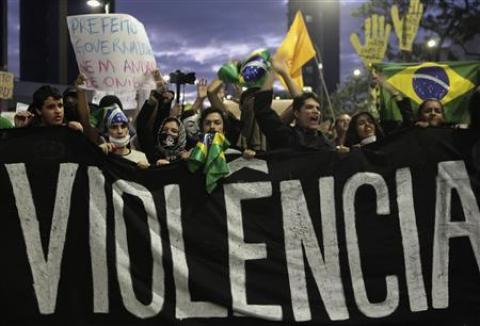President Dilma Rousseff on Tuesday sought to defuse a massive protest movement sweeping Brazil, acknowledging the need for better public services and more responsive governance as demonstrations continued in some cities around the country.
Speaking the morning after more than 200,000 Brazilians marched in over a half-dozen cities, Rousseff said her government remains committed to social change and is listening attentively to the many grievances expressed at the demonstrations.
"Brazil woke up stronger today," Rousseff said in a televised speech in Brasilia. "The size of yesterday's demonstrations shows the energy of our democracy, the strength of the voice of the streets and the civility of our population."
Monday's demonstrations were the latest in a flurry of protests over the past two weeks that have fed on widespread frustration with poor public services, police violence and government corruption.
The protests, organized mostly by university students through snowballing social media campaigns, marked the first time that Brazilians have taken to the streets on such a large scale since economic volatility and a corruption scandal led to the toppling of a president in the early 1990s.
The demonstrations started as small protests in a few cities against an increase in bus and subway fares but quickly ballooned into a national movement after police fired rubber bullets at protesters in Sao Paulo last week in clashes that injured more than 100 people.
Eager to ease tensions and prevent future protests, officials in at least five cities, including important state capitals such as Porto Alegre and Recife, announced plans on Tuesday to lower bus fares.
But demonstrations continued in a few cities around the country, including Rio de Janeiro and Sao Paulo, where thousands gathered in front of the city's landmark cathedral in what protesters hoped would be a final push persuading local officials to cancel the bus fare increase.
Sao Paulo Mayor Fernando Haddad, a prominent figure in Rousseff's left-leaning Workers' Party, said in a meeting with leaders of the protest movement on Tuesday that he is considering a cut in bus fares but needs to find ways to compensate for the loss in revenue.
Even if Haddad does cede, it remains unclear if that would be enough to halt the protests, given that protesters have embraced so many other causes.
ROUSSEFF TURNS TO LULA
Rousseff traveled to Sao Paulo on Tuesday afternoon to meet with Haddad and former President Luiz Inacio Lula da Silva, her predecessor and political mentor. A former metalworker and union boss who led massive protests in the late 1970s, Lula remains an important power broker in Brazilian politics.
The unrest comes at a delicate time for Rousseff, whose administration is struggling to rein in high inflation and get the economy back on track after two years of sluggish growth. Polls show Rousseff remains widely popular, but her approval ratings have begun to slip in recent weeks for the first time since taking office in early 2011.
A leftist guerrilla in her youth who was jailed for conspiring against Brazil's military dictatorship, Rousseff said the sight of so many young Brazilians marching for their rights moved her.
She also said her government sympathizes with the many grievances expressed at the demonstrations, from calls for more spending on education and healthcare to better and more affordable public transportation.
"My government hears the voices clamoring for change, my government is committed to social transformation," Rousseff said. "Those who took to the streets yesterday sent a clear message to all of society, above all to political leaders at all levels of government."
(Additional reporting by Pedro Fonseca and Jeferson Ribeiro; Editing by Mohammad Zargham)


Spread the word